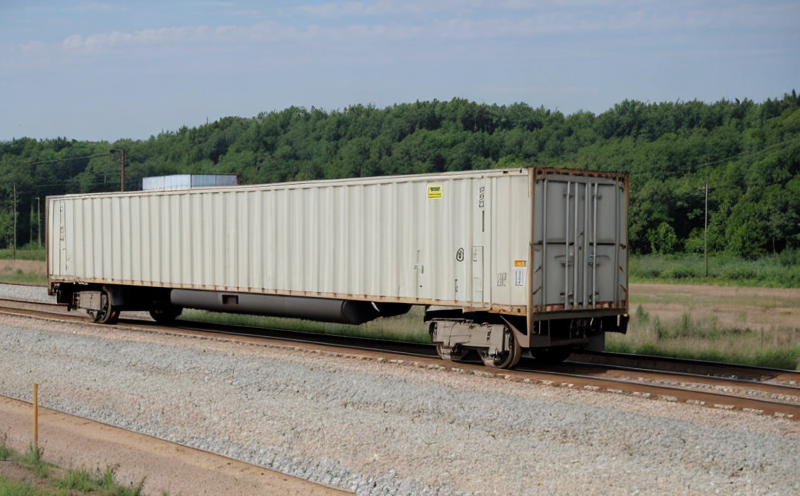EN 12663-3 Fatigue Testing of Freight Wagon Structural Components
The European Standard EN 12663-3 provides a framework for fatigue testing freight wagon structural components, ensuring the durability and reliability of railway wagons under cyclic loading. This standard is crucial for maintaining the integrity of cargo and freight wagons, especially in environments where they are subjected to varying stress conditions over extended periods.
The primary focus of this service is on the fatigue strength assessment of key structural elements such as couplers, drawgear, buffers, and other critical parts that experience significant cyclic loading. Fatigue testing ensures that these components can withstand repeated stress cycles without failure, thereby enhancing safety and operational efficiency in railway transportation systems.
The testing process involves subjecting specimens to a predefined number of cyclic loadings until they reach their fatigue limit. This method helps identify any potential weaknesses or design flaws before the product reaches its end users. Compliance with EN 12663-3 not only ensures safety but also demonstrates a commitment to quality and reliability, which is essential for maintaining market share in competitive railway industries.
Our laboratory adheres strictly to this standard during testing, ensuring that all procedures follow international best practices. By doing so, we provide clients with accurate data that can be used for further design improvements or adjustments if necessary. This approach helps manufacturers comply with regulatory requirements while also gaining a competitive edge by producing high-quality products.
The fatigue testing process typically includes several stages: specimen preparation, loading setup, cyclic loading application, monitoring and data collection, and final analysis. Each stage is critical to ensuring accurate results that reflect real-world conditions experienced by railway wagons during operation.
Specimen preparation involves selecting representative samples from production batches or individual units, depending on the client’s requirements. Loading setups are designed based on specific loading scenarios encountered in actual service conditions, simulating realistic stress patterns. During cyclic loading application, continuous monitoring is performed using state-of-the-art instrumentation to gather detailed information about each cycle's impact.
Data collected during testing is analyzed meticulously to determine whether the specimen has reached its fatigue limit according to EN 12663-3 criteria. If any issues arise, corrective actions are taken promptly to address them before proceeding further with validation tests or production runs. This comprehensive approach ensures that only reliable and safe components make it into service.
Our commitment to precision and accuracy extends beyond just meeting standards; we also strive to exceed expectations by providing detailed reports summarizing all findings from testing activities conducted under EN 12663-3 guidelines. These reports serve as valuable resources for both current projects and future development efforts aimed at enhancing product performance.
In summary, our fatigue testing service offers unparalleled expertise in assessing the structural integrity of freight wagon components using EN 12663-3 methodologies. By leveraging advanced technologies and adhering strictly to international standards, we ensure that every test conducted meets or exceeds industry benchmarks.
Frequently Asked Questions
Benefits
- Enhances safety and operational efficiency in railway transportation systems.
- Identifies potential weaknesses or design flaws early on, allowing for timely corrections.
- Ensures compliance with EN 12663-3 international standards, thereby demonstrating a commitment to quality and reliability.
- Provides accurate data that can be used for further design improvements or adjustments if necessary.
The above benefits underscore the importance of our fatigue testing service in maintaining high standards within the railway industry. By leveraging advanced technologies and adhering strictly to international standards, we ensure that every test conducted meets or exceeds industry benchmarks.
Eurolab Advantages
- Comprehensive expertise in EN 12663-3 fatigue testing methodologies.
- Access to cutting-edge instrumentation and facilities for precise measurements.
- Detailed reports summarizing all findings from testing activities conducted under EN 12663-3 guidelines.
- A commitment to precision, accuracy, and consistency in every test performed.
At Eurolab, we pride ourselves on offering unparalleled expertise and reliability when it comes to fatigue testing according to EN 12663-3. Our advanced facilities and experienced staff ensure that each specimen is subjected to rigorous scrutiny, resulting in accurate results that can be trusted by all stakeholders involved.
Competitive Advantage and Market Impact
- We offer unmatched precision and accuracy in fatigue testing of freight wagon structural components.
- Our adherence to international standards like EN 12663-3 sets us apart from competitors who may not meet such high-quality benchmarks.
- The detailed reports we provide serve as valuable resources for both current projects and future development efforts aimed at enhancing product performance.
These advantages contribute significantly to our competitive position in the market, enabling us to deliver exceptional value to clients across various sectors. By ensuring that every test conducted meets or exceeds industry benchmarks, we help maintain high standards within the railway industry while fostering innovation and continuous improvement.





